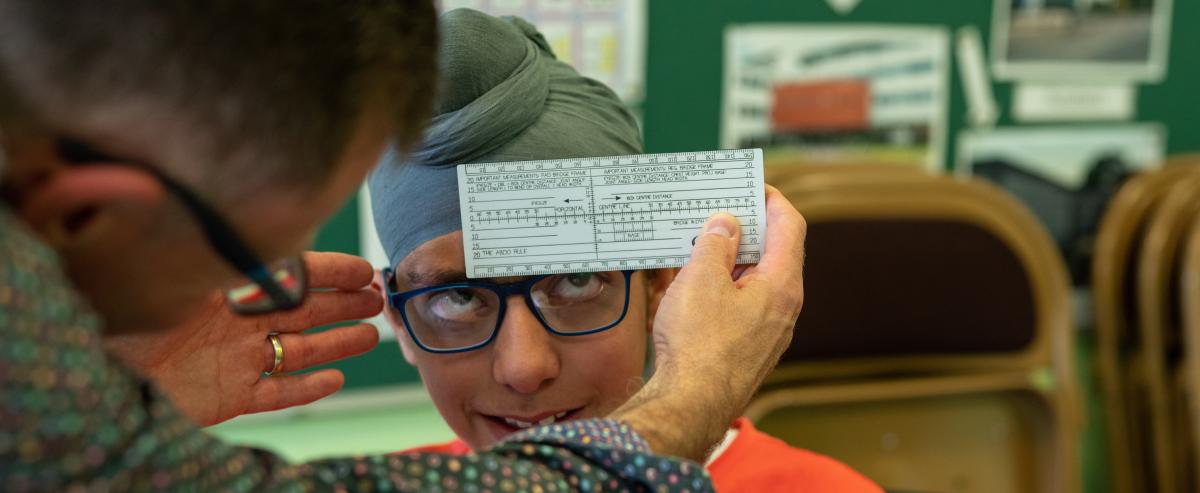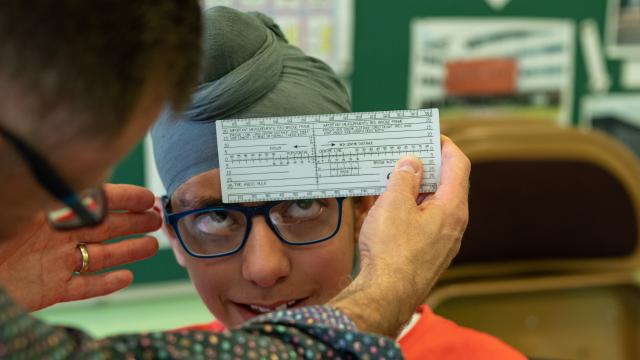
Optical inclusion: the difference made by eye care teams in special schools
The government backs the Special Schools Eye Care Service!
In June 2023 we were delighted to receive confirmation from the government that NHS sight tests will be on offer to all pupils in special schools from 2024/2025. As the article below was written when the service was in jeopardy, it may now contain some out of date information relating to future provision. Thank you to everyone who has supported the campaign, written blogs and stood firm about the benefits of the service.
This week we are featuring a series of blogs on the benefits of bringing eye care into special schools. Here professionals involved in the new NHS Service share how different disciplines in eye care are coming together, and how the expertise of Dispensing Opticians has been crucial for so many children seen in special schools. Research has shown over 4 in 10 children in special schools need glasses and support to get used to them.
Elaine Clark is Head Optometrist at Warrington and Halton Teaching Hospital NHS Foundation Trust.
“At Warrington, we have been trailblazing special education eye care for many years as our Hospital Eye Service team of Optometrists, Orthoptists and Consultant Ophthalmologist have provided outreach eye care in local special schools. It is so rewarding to see children in their familiar surroundings in contrast to the noisy, busy, sometimes quite frightening, environment of the hospital eye clinic.
"We find it helps them get used to having their eyes examined, making the whole experience feel comfortable and often fun! We find children who without this service could not successfully access eye care and therefore could not use their vision to their full potential, leaving them with lifelong visual impairment, and in some cases could even have lost vision.
"However, while we were already set up for sight testing in schools, the issue we frequently encountered was how to ensure children got the glasses they needed. Hospital services can issue vouchers for glasses, but parents/carers would then need to visit a local optician for the glasses to be made up and fitted. Children still faced the challenges of attending these appointments in unfamiliar surroundings, and sustaining glasses wear, while the vouchers would not always cover the cost of the most suitable glasses for these children.
"We were keen to be involved in the new NHS contract and now have the support of our Dispensing Optician colleagues - who I must say, teaching staff and pupils alike, adore! So many more children are now accessing and wearing appropriate glasses – with obvious benefits to their education and independence.
"The NHS Service also funds a wider range of frames including ones that fit for children with different needs – such as special facial characteristics or wheelchair headrests. All children needing glasses are provided with two pairs, so they aren’t without glasses if there is a breakage.
"I cannot emphasise enough this is exactly the one stop shop of eye care that these children need.”
Debbie McGill is Head of Policy and Public Affairs for the Association of Dispensing Opticians (ABDO):
“ ABDO is the professional body that represents Dispensing Opticians. For many years we have supported and helped shape the development of this model of eye care in special schools.
ABDO is the professional body that represents Dispensing Opticians. For many years we have supported and helped shape the development of this model of eye care in special schools.
"Dispensing Opticians are registered healthcare professionals whose skills and support make the vital difference to all spectacle users, particularly in children’s eye care, giving them the best start in life to learn, develop social skills and much more. In the case of children with learning disabilities this is no different.
"The benefit of this programme is being able to provide care for the children in their familiar surroundings, and so provide the best glasses for them and their needs. The other added benefits are that the complete service includes the fitting of the glasses, once glazed, and whilst the Dispensing Optician is in attendance they can also repair any breakages, recognising that this may happen more often for children with learning disabilities.
"Dispensing Opticians and Optometrist teams have invested a lot of time and funding of their own to deliver this vital service which is now in jeopardy of being discontinued in non-residential special schools. This is despite research that has shown that over 4 in 10 children in day special schools need glasses. Once they have their glasses, and this is the most vital point, children then have the support they need to live well and learn well.”
The clinical model for providing this service in special schools was developed by the four professional bodies in eye care and can be found here Framework for provision of eye care in special schools
Watch the NHS England film made for clinicians interested in delivering the service.



